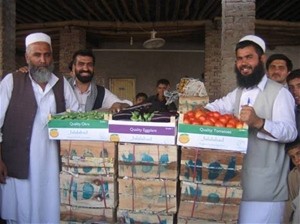Home » Reports & Data » Progress » Transforming Lives » Stimulating Growth across Agricultural Supply Chains

Wholesalers supported through improved packaging
USAID/Afghanistan
Value chains allow small, medium and large-scale farmers to engage in the production and marketing of licit crops in a sustainable and profitable fashion.
13 FEBRUARY 2007 | KABUL
USAID’s Alternative Livelihoods Program for the Eastern Region (ALP/E) is supporting the development of agricultural value chains, as a way to allow small, medium and large-scale farmers to engage in the production and marketing of licit crops in a sustainable and profitable fashion.
Recognizing the productive potential, as well as the competitive advantage of Afghanistan’s Eastern Region, ALP/E is concentrating its investments in promoting the growth of the fruit, nut and vegetable subsectors, and the pursuit of high-end markets.
Within this context, ALP/E’s agricultural programs are based on a concerted effort to ensure that the selection of inputs available in the marketplace, crop production technologies, as well as grading, packaging and agro-processing practices respond to specific market requirements.
In the spring of 2006, US$4 million in USAID support to one of ALP/E’s agricultural programs resulted in a 59,000 metric ton increase in regional vegetable production, incorporating some 6,800 hectares, supplying the main urban centers of Afghanistan and Pakistan and representing a wholesale value of over US$10 million.
Follow-up programs continue to work with local farmers on increasing productivity, produce quality and access to markets. In the coming season, ALP/E will work with 22,000 farmers to produce improved vegetable varieties and link them to regional wholesalers. The Program is also assisting wholesalers in the Eastern Region to penetrate high value markets, and providing assistance with food safety and quality standards.
This is enabling progressive farmers and traders to meet the standards of hotels, restaurants and supermarkets in Afghanistan, as well as export markets.
ALP/E’s medium term strategy for the development of the fruit and nut industry includes the establishment of 6,000 new hectares of fruit and nut trees which will result in the production of more than 11,000 metric tons of fruit and nuts by 2011, increasing to 35,000 tons by 2013, which is expected to result in aggregate revenues to local farmers of US$12M per annum. Within ten years more than $50 million of gross revenue will have accrued directly to local farmers, generating a similar amount through multiplier effects on the local economy.
The program’s short-term strategy includes the Fruit Marketing Program aimed to rehabilitate existing fruit and nut orchards and promote modern production practices, grading, packaging and the facilitation of market linkages. Beneficiaries of the Fruit Marketing Program include some 4,000 farmers already organized in over 90 production and marketing groups (exptect to reach 7,000 farmers by the end of 2007). The program, launched in June 2006 has already facilitated sales of fresh fruit at prices 14 percent above those paid to non-beneficiaries.
Sales volumes are expected to reach 1,700 metric tons by the end of 2006 and 5,800 metric tons in 2007, resulting in incremental aggregate revenues of approximately US$1Million and US$3.3Million, respectively.
Consistent with its value chain approach, ALP/E has established a comprehensive market information system that collects, analyzes and disseminates farm-gate wholesale and retail prices for agricultural commodities—including seeds, fertilizers, fresh fruit, vegetables and meat products, thereby encouraging competition and increasing market efficiency. Market information is disseminated via local radio stations, together with seasonally appropriate extension messages.
Women entrepreneurs play an important role in all of ALP/E’s agribusiness programs; activities include commercial poultry operations, vegetable seedling enterprises, forestry nurseries and agro-processing, thereby allowing them to become key players in the development of the rural economies.
Other economic development programs include the promotion of semi-commercial and commercial beef cattle operations, support to the increase of food self-reliance by increasing the productivity of staple crops, through adaptive research, demonstrations and local seed production; and strong support to emerging businesses through a comprehensive set of business development services.
The ALP/E infrastructure program collaborates and contributes to the economic development of eastern region by rehabilitating roads, rebuilding irrigation systems and flood protection for agricultural land.
ALP/E’s systemic and inclusive approach for economic development is already showing signs of success in the promotion of a licit economy, the reactivation of the productive apparatus and the integration of both men and women as partners in rebuilding Eastern Afghanistan.







Comment
Make a general inquiry or suggest an improvement.